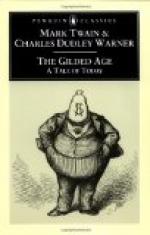The letters were a portion of the correspondence of Major Lackland with Silas Hawkins; parts of them were missing and important letters were referred to that were not here. They related, as the reader knows, to Laura’s father. Lackland had come upon the track of a man who was searching for a lost child in a Mississippi steamboat explosion years before. The man was lame in one leg, and appeared to be flitting from place to place. It seemed that Major Lackland got so close track of him that he was able to describe his personal appearance and learn his name. But the letter containing these particulars was lost. Once he heard of him at a hotel in Washington; but the man departed, leaving an empty trunk, the day before the major went there. There was something very mysterious in all his movements.
Col. Sellers, continuing his testimony, said that he saw this lost letter, but could not now recall the name. Search for the supposed father had been continued by Lackland, Hawkins and himself for several years, but Laura was not informed of it till after the death of Hawkins, for fear of raising false hopes in her mind.
Here the Distract Attorney arose and said,
“Your Honor, I must positively object to letting the witness wander off into all these irrelevant details.”
Mr. Braham. “I submit your honor, that we cannot be interrupted in this manner we have suffered the state to have full swing. Now here is a witness, who has known the prisoner from infancy, and is competent to testify upon the one point vital to her safety. Evidently he is a gentleman of character, and his knowledge of the case cannot be shut out without increasing the aspect of persecution which the State’s attitude towards the prisoner already has assumed.”
The wrangle continued, waxing hotter and hotter. The Colonel seeing the attention of the counsel and Court entirely withdrawn from him, thought he perceived here his opportunity, turning and beaming upon the jury, he began simply to talk, but as the grandeur of his position grew upon him —talk broadened unconsciously into an oratorical vein.
“You see how she was situated, gentlemen; poor child, it might have broken her, heart to let her mind get to running on such a thing as that. You see, from what we could make out her father was lame in the left leg and had a deep scar on his left forehead. And so ever since the day she found out she had another father, she never could, run across a lame stranger without being taken all over with a shiver, and almost fainting where she, stood. And the next minute she would go right after that man. Once she stumbled on a stranger with a game leg; and she was the most grateful thing in this world—but it was the wrong leg, and it was days and days before she could leave her bed. Once she found a man with a scar on his forehead and she was just going to throw herself into his arms,` but he stepped out




